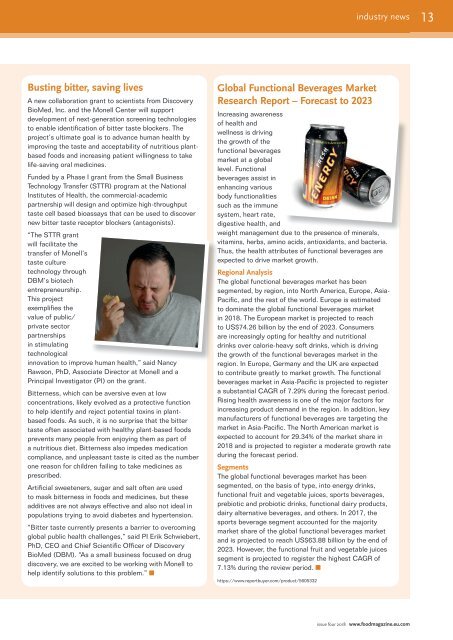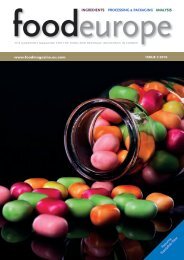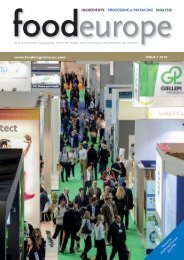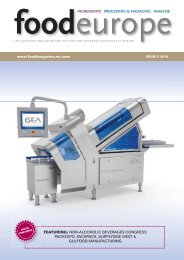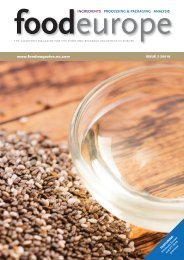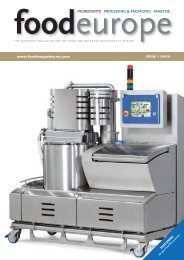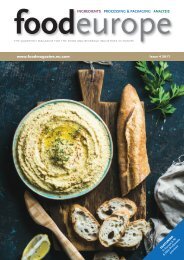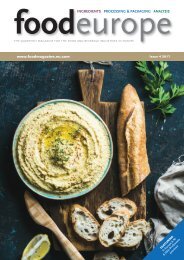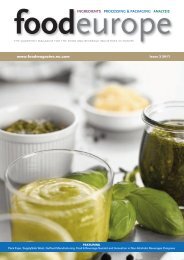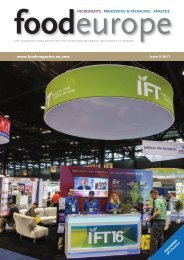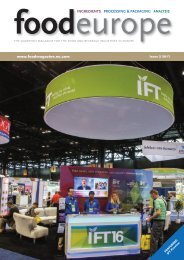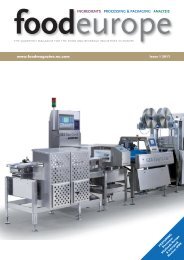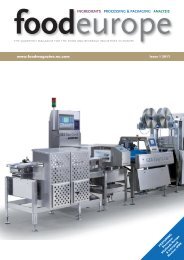Issue 4 2018
You also want an ePaper? Increase the reach of your titles
YUMPU automatically turns print PDFs into web optimized ePapers that Google loves.
industry news<br />
13<br />
Busting bitter, saving lives<br />
A new collaboration grant to scientists from Discovery<br />
BioMed, Inc. and the Monell Center will support<br />
development of next-generation screening technologies<br />
to enable identification of bitter taste blockers. The<br />
project’s ultimate goal is to advance human health by<br />
improving the taste and acceptability of nutritious plantbased<br />
foods and increasing patient willingness to take<br />
life-saving oral medicines.<br />
Funded by a Phase I grant from the Small Business<br />
Technology Transfer (STTR) program at the National<br />
Institutes of Health, the commercial-academic<br />
partnership will design and optimize high-throughput<br />
taste cell based bioassays that can be used to discover<br />
new bitter taste receptor blockers (antagonists).<br />
“The STTR grant<br />
will facilitate the<br />
transfer of Monell’s<br />
taste culture<br />
technology through<br />
DBM’s biotech<br />
entrepreneurship.<br />
This project<br />
exemplifies the<br />
value of public/<br />
private sector<br />
partnerships<br />
in stimulating<br />
technological<br />
innovation to improve human health,” said Nancy<br />
Rawson, PhD, Associate Director at Monell and a<br />
Principal Investigator (PI) on the grant.<br />
Bitterness, which can be aversive even at low<br />
concentrations, likely evolved as a protective function<br />
to help identify and reject potential toxins in plantbased<br />
foods. As such, it is no surprise that the bitter<br />
taste often associated with healthy plant-based foods<br />
prevents many people from enjoying them as part of<br />
a nutritious diet. Bitterness also impedes medication<br />
compliance, and unpleasant taste is cited as the number<br />
one reason for children failing to take medicines as<br />
prescribed.<br />
Artificial sweeteners, sugar and salt often are used<br />
to mask bitterness in foods and medicines, but these<br />
additives are not always effective and also not ideal in<br />
populations trying to avoid diabetes and hypertension.<br />
“Bitter taste currently presents a barrier to overcoming<br />
global public health challenges,” said PI Erik Schwiebert,<br />
PhD, CEO and Chief Scientific Officer of Discovery<br />
BioMed (DBM). “As a small business focused on drug<br />
discovery, we are excited to be working with Monell to<br />
help identify solutions to this problem.” n<br />
Global Functional Beverages Market<br />
Research Report – Forecast to 2023<br />
Increasing awareness<br />
of health and<br />
wellness is driving<br />
the growth of the<br />
functional beverages<br />
market at a global<br />
level. Functional<br />
beverages assist in<br />
enhancing various<br />
body functionalities<br />
such as the immune<br />
system, heart rate,<br />
digestive health, and<br />
weight management due to the presence of minerals,<br />
vitamins, herbs, amino acids, antioxidants, and bacteria.<br />
Thus, the health attributes of functional beverages are<br />
expected to drive market growth.<br />
Regional Analysis<br />
The global functional beverages market has been<br />
segmented, by region, into North America, Europe, Asia-<br />
Pacific, and the rest of the world. Europe is estimated<br />
to dominate the global functional beverages market<br />
in <strong>2018</strong>. The European market is projected to reach<br />
to US$74.26 billion by the end of 2023. Consumers<br />
are increasingly opting for healthy and nutritional<br />
drinks over calorie-heavy soft drinks, which is driving<br />
the growth of the functional beverages market in the<br />
region. In Europe, Germany and the UK are expected<br />
to contribute greatly to market growth. The functional<br />
beverages market in Asia-Pacific is projected to register<br />
a substantial CAGR of 7.29% during the forecast period.<br />
Rising health awareness is one of the major factors for<br />
increasing product demand in the region. In addition, key<br />
manufacturers of functional beverages are targeting the<br />
market in Asia-Pacific. The North American market is<br />
expected to account for 29.34% of the market share in<br />
<strong>2018</strong> and is projected to register a moderate growth rate<br />
during the forecast period.<br />
Segments<br />
The global functional beverages market has been<br />
segmented, on the basis of type, into energy drinks,<br />
functional fruit and vegetable juices, sports beverages,<br />
prebiotic and probiotic drinks, functional dairy products,<br />
dairy alternative beverages, and others. In 2017, the<br />
sports beverage segment accounted for the majority<br />
market share of the global functional beverages market<br />
and is projected to reach US$63.88 billion by the end of<br />
2023. However, the functional fruit and vegetable juices<br />
segment is projected to register the highest CAGR of<br />
7.13% during the review period. n<br />
https://www.reportbuyer.com/product/5605332<br />
issue four <strong>2018</strong> www.foodmagazine.eu.com


